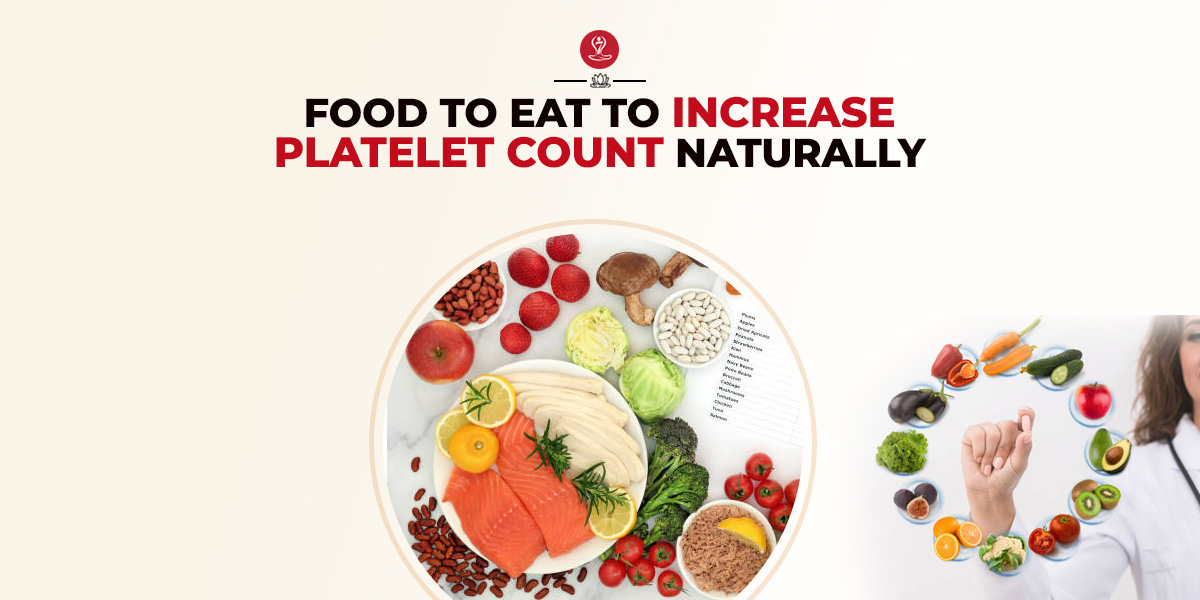
Unprocessed fruits, vegetables, legumes, whole grains, certain vitamins, and minerals, including vitamins B12 and C, folate, and iron, may help increase platelet count naturally.
The Platelets Count:
Platelet count is a blood test that measures the number of platelets in a person’s blood. The normal range of platelet count is usually between 150,000 to 450,000 platelets per microliter (mcL) of blood.
Low platelet count, also known as thrombocytopenia, can increase the risk of bleeding, and it may be caused by various factors, such as viral infections, autoimmune diseases, certain medications, or bone marrow disorders. On the other hand, high platelet count, also known as thrombocytosis, can increase the risk of blood clots and may be associated with conditions such as cancer, infections, or inflammatory disorders.
So it is essential to know how to increase platelet count naturally.
This article lists ways to increase platelet levels through nutrition, which includes both the diet itself and supplements.
Foods that increase platelet count
While there are no specific foods that can directly increase platelet count, a well-balanced and nutrient-rich diet can help support the body’s production and maintenance of platelets. Here are some foods that are rich in nutrients that can be beneficial for platelet health:
Vitamin B-12-rich foods
Vitamin B-12 is an essential nutrient that is necessary for the production of healthy red blood cells and platelets.
Studies have shown that vitamin B-12 deficiency can result in reduced platelet production and an increased risk of bleeding disorders.
Therefore, vitamin B-12 intake is important for proper platelet production and overall blood health, such as animal-based products, including:
beef and beef liver
eggs
fish, such as:
clams
trout
salmon
tuna
dairy products, such as milk and cheese
People who follow a strict vegan or vegetarian diet may be at risk of vitamin B-12 deficiency and may need to consider taking vitamin B-12 supplements or eating fortified foods to ensure adequate intake.
Vitamin C-rich foods
Vitamin C-rich foods can increase platelet count, and a diet rich in vitamin C can support overall blood health and potentially prevent platelet destruction.
This Vitamin is an essential nutrient that plays a vital role in various functions in the body, including immune system function, collagen production, and wound healing.
Here are some vitamin C-rich foods that play a vital role in immune function, which is essential for a healthy platelet count.
- Citrus fruits: Citrus fruits such as oranges, grapefruits, lemons, and limes are excellent sources of vitamin C.
- Berries: Berries such as strawberries, raspberries, and blueberries are high in vitamin C.
- Kiwi: Kiwi is a good source of vitamin C and other nutrients that can support overall blood health.
- Papaya: Papaya is another tropical fruit that is high in vitamin C.
- Bell peppers: Bell peppers, especially red and yellow peppers, are rich in vitamin C and other antioxidants that can support blood health.
Vitamin D-rich foods
Vitamin D is an essential nutrient that plays a critical role in bone health and immune system function. Additionally, vitamin D also plays an essential role in the function of the bone marrow cells that produce platelets and other blood cells.
Sources of natural vitamin D include:
- Fatty fish: Fatty fish such as salmon, tuna, and mackerel are excellent sources of vitamin D.
- Egg yolks: Egg yolks contain vitamin D and can be a good source for people who cannot consume fish.
- Mushrooms: Certain types of mushrooms are good sources of vitamin D, especially when exposed to sunlight or UV light.
- Fortified foods: Many foods such as milk, orange juice, and cereals are fortified with vitamin D.
Folate-rich foods
Folate, also known as vitamin B9, is a water-soluble vitamin that is essential for many bodily functions, including the production of healthy red blood cells and platelets.
Therefore, incorporating folate-rich foods into the diet can help support proper blood cell production and potentially increase platelet count.
Foods containing folate or folic acid include:
- Leafy greens: Dark, leafy greens such as spinach, kale, and collard greens are excellent sources of folate.
- Legumes: Legumes such as lentils, chickpeas, and black beans are good sources of folate and can also provide other nutrients that support blood health.
- Asparagus: Asparagus is a vegetable that is high in folate and other nutrients that can help support healthy blood cell production.
- Citrus fruits: Citrus fruits such as oranges, lemons, and grapefruits are not only high in vitamin C but are also good sources of folate.
- Avocado: Avocado is a fruit that is rich in folate and other nutrients that can support overall health.
Iron-rich food
Iron is an essential mineral that plays a crucial role in the production of healthy red blood cells, which can support overall blood health and potentially increase platelet count.
Incorporating iron-rich foods into the diet can help maintain adequate iron levels and support proper blood cell production.
- Red meat: Red meat, such as beef and lamb, is one of the best sources of iron.
- Poultry: Chicken and turkey are good sources of iron, especially when consumed with the skin.
- Seafood: Seafood such as clams, oysters, and shrimp are good sources of iron.
- Beans: Legumes such as lentils, kidney beans, and chickpeas are good sources of iron and can also provide fiber and other nutrients that support overall health.
- Leafy greens: Dark, leafy greens such as spinach and kale are good sources of iron and can also provide other nutrients that support blood health.
Foods that decrease platelet count
While there are many foods that are generally considered healthy, some foods and substances may have the potential to decrease platelet count in certain individuals. Here are some examples:
- Excessive alcohol consumption
- Quinine-containing foods and beverages such as tonic water, bitter melon, and grapefruit.
- High intake of sugary and processed foods
- Omega-3 supplements
- Cranberry juice
- Cow’s milk
- Tahini
Conclusion
To maintain a good platelet count in the blood and improve platelets naturally, you can choose foods that are rich in essential nutrients such as Vitamin K, Vitamin B12, Folate, Vitamin C, Iron, Vitamin A, and Vitamin D. Can
RELATED ARTICLES
Oct 21, 2024
Step-Ups: A Functional Exercise for Daily Activities
The step-ups exercise is very effective for increasing functional strength. When combined with the lunge, it not only strengthens the[...]
Sep 19, 2024
Japan Radio Taiso: The Heartbeat of Japanese Morning Rituals
Radio Taiso is an integral part of Japanese culture that not only encourages physical health but also contributes to collective[...]
Sep 06, 2024
The Best Air-Purifying Plants to Boost Your Indoor Air Quality
Imagine this: You’re finally relaxing after a long day, but something feels off. The air feels heavy, and your mind[...]
RECENT POSTS
Disclaimer
The content is purely informative and educational in nature and should not be construed as medical advice. Please use the content only in consultation with an appropriate certified medical or healthcare professional







